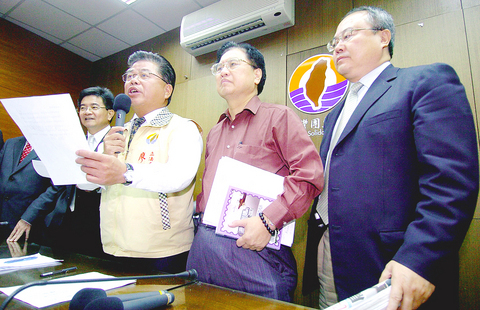The Taiwan Solidarity Union (TSU) yesterday withdrew its support for the pan-blue camp's plan to propose a third recall motion against President Chen Shui-bian (陳水扁).
TSU caucus whip Liao Pen-yen (廖本煙) told a press conference that the caucus would respect the president's promise that he would step down if first lady Wu Shu-jen (吳淑珍) were found guilty.
Liao said the TSU would only support the new recall motion on the condition that "concrete evidence concerning corruption is presented," but he did not say if Taipei District Prosecutor Eric Chen's (陳瑞仁) indictment would be considered "concrete evidence."

PHOTO: LO PEI-DER, TAIPEI TIMES
He said the caucus would suggest that TSU headquarters "wait, listen and see" what the public response was before deciding the caucus' stance on the recall motion.
The decision was agreed upon unanimously after yesterday morning's caucus meeting, Liao said, but TSU Legislator Lai Shin-yuan (賴幸媛) left the meeting before it ended.
She did not talk to reporters after leaving the meeting.
TSU Chairman Shu Chin-chiang (
However, yesterday afternoon TSU Taipei mayoral candidate Clara Chou (周玉蔻) held a joint press conference with Lai and voiced support for the recall motion.
Chou said that judging from Lee's recent remarks that "justice, morality, conscience and the concept of right or wrong were the best remedies for the Democratic Progressive Party [DPP] and were the hope for Taiwan's society," the former president is actually in favor of the recall motion.
Chou urged DPP legislators to vote for the recall motion in the legislature and let the people decide whether Chen should resign. She announced that one of her campaign themes would be that she is "pro-recall motion."
Chou said TSU legislators Huang Chung-yung (黃宗源), David Huang (黃適卓) and Liao were the only three TSU caucus members who were "pro-Chen" instead of being "pro-Lee."
In response to Chou's comments, Shu said: "She is not a legislator or a member of the TSU's Central Executive Committee. Although she has her own campaign strategy, she cannot stand for the TSU's headquarters or Lee."

CHAOS: Iranians took to the streets playing celebratory music after reports of Khamenei’s death on Saturday, while mourners also gathered in Tehran yesterday Iranian Supreme Leader Ayatollah Ali Khamenei was killed in a major attack on Iran launched by Israel and the US, throwing the future of the Islamic republic into doubt and raising the risk of regional instability. Iranian state television and the state-run IRNA news agency announced the 86-year-old’s death early yesterday. US President Donald Trump said it gave Iranians their “greatest chance” to “take back” their country. The announcements came after a joint US and Israeli aerial bombardment that targeted Iranian military and governmental sites. Trump said the “heavy and pinpoint bombing” would continue through the week or as long

TRUST: The KMT said it respected the US’ timing and considerations, and hoped it would continue to honor its commitments to helping Taiwan bolster its defenses and deterrence US President Donald Trump is delaying a multibillion-dollar arms sale to Taiwan to ensure his visit to Beijing is successful, a New York Times report said. The weapons sales package has stalled in the US Department of State, the report said, citing US officials it did not identify. The White House has told agencies not to push forward ahead of Trump’s meeting with Chinese President Xi Jinping (習近平), it said. The two last month held a phone call to discuss trade and geopolitical flashpoints ahead of the summit. Xi raised the Taiwan issue and urged the US to handle arms sales to

BIG SPENDERS: Foreign investors bought the most Taiwan equities since 2005, signaling confidence that an AI boom would continue to benefit chipmakers Taiwan Semiconductor Manufacturing Co’s (TSMC, 台積電) market capitalization swelled to US$2 trillion for the first time following a 4.25 percent rally in its American depositary receipts (ADR) overnight, putting the world’s biggest contract chipmaker sixth on the list of the world’s biggest companies by market capitalization, just behind Amazon.com Inc. The site CompaniesMarketcap.com ranked TSMC ahead of Saudi Aramco and Meta Platforms Inc. The Taiwanese company’s ADRs on Tuesday surged to US$385.75 on the New York Stock Exchange, as strong demand for artificial intelligence (AI) applications led to chip supply constraints and boost revenue growth to record-breaking levels. Each TSMC ADR represents

State-run CPC Corp, Taiwan (CPC, 台灣中油) yesterday said that it had confirmed on Saturday night with its liquefied natural gas (LNG) and crude oil suppliers that shipments are proceeding as scheduled and that domestic supplies remain unaffected. The CPC yesterday announced the gasoline and diesel prices will rise by NT$0.2 and NT$0.4 per liter, respectively, starting Monday, citing Middle East tensions and blizzards in the eastern United States. CPC also iterated it has been reducing the proportion of crude oil imports from the Middle East and diversifying its supply sources in the past few years in response to geopolitical risks, expanding